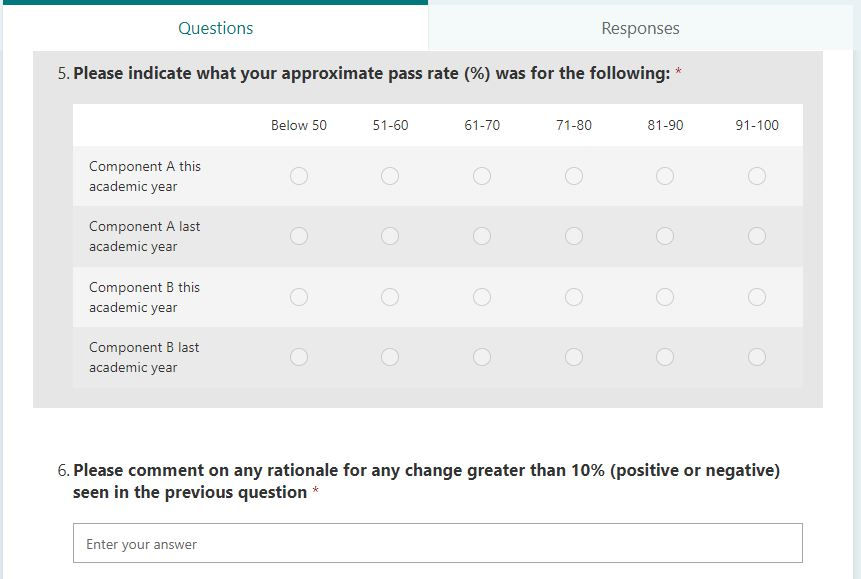Infobots, transFORM! Let's change how we collect information.
- CP Moore
- May 3, 2022
- 9 min read
Updated: May 5, 2022

This week's entry is kind of a follow on to my blog on the power of automation, as I think of new ways of applying that simple premise using widely available and accessible tools in our toolbox.
Data is really important to universities. At senior leadership levels, data helps paint a summary picture of how things are looking across the strategic portfolio, and provide metrics by which action can be targeted or success can be bragged about. At student level, data in terms of grades tells them how well they are doing and what kind of academic trajectory they are on with their current effort and engagement. And everywhere in between, data helps identify where support is needed, where intervention may be required, and where explanation for performance can be pulled. When collected properly, it can give us a sense of how well engaged our students are, how often they are using the resources we provide them with, or how timely staff are doing that which they are asked. It can show pinch points on services and provide a timeline of whether something is worth keeping going or whether we should divert our efforts elsewhere. It can be powerful stuff.
Yes, data can provide the bearing for us to set a course towards meaning and justification on the journey of academic experience.
Or it can just be a pile of spreadsheets and pie charts and god knows what sitting on a thousand different computers, created using a dozen different systems, and often brought out only to show there is a problem but rarely to provide the means towards a solution.
It all depends on how you collect it, who collects it, where it goes, and the reason you got it really. Now if you're really lucky, you'll have some people in your circle of brilliant minds worth picking who are (sometimes as their primary role, sometimes alongside a host of other responsibilities) absolute legends at data collection, analysis and utilisation. These people spend their working days gathering data behind the scenes and from the backends of anywhere and everywhere, doing amazing things with it, and presenting it to show the impact of what your university is trying out. These data-gurus might work in areas that look closely at university-wide data that impacts (and is impacted primarily by) students (I'm looking at you geniuses, the BI team - thank you for you). Others may look at the impact and use of resources from a staff engagement perspective (you might occasionally lose some of these wonderful people to the private sector, and thus that valuable window into understanding just what the devil all this data flying about means in the larger sense - damn it all, Tom!). But these are the teams and the individuals who are looking at high level data of things gone by, collected by semi-organic means of people logging in, accessing something, just going about their day in a world of data analytics, and having some highly skilled minds at the other end making sense of all that. That data helps steer the ship, inform far-reaching decisions, and shape strategy based on trends and interactions. So what about when you just want a better way of collecting information? Information to do something with, possibly at an individual level?
This is where process comes in. That means of doing a thing (really in any organisation, not just limited to higher education). That thing could be anything from applying for a job (or a course), to claiming some expenses, to reporting back on something that feeds into a wider something, to giving (or getting) permission for something. And this is how (loosely speaking) it tends to go:
Stumble around in the digital dark trying to find the place that tells you where to find the thing that will let you provide information about the thing that you want to do.
At that place, or via that person you eventually find as the contact, you will get access to a form within which the questions "they" need answers to can be provided. But not just any form. This form will usually be in an interminable Microsoft Word format so that you can lose the last of your sanity as (among a whole raft of other comedic frustrations of bad form creation) poorly constructed boxes move about the page unsure where they wish to tether themselves, you delete a slew of full-stops as you find the text you enter doesn't replace those dots but merely move the whole line further across the page, and as the bold formatting of a text box header follows your own text and turns all your responses into the same bold font. And don't forget that reminder on opening said Word document that the file you have just downloaded will now be updated to the latest format because the damn thing was created during the days of Word 97! Occasionally it won't be Word of course. No, sometimes it will be Excel. "Yippee," you may cry, "an application that is at least based on cells and tables!" Fear not though, the end of your tether continues to creep ever closer, as you discover the unnecessarily merged cells, the un-editable rows, the formula errors that refuse to allow you to enter the form insists you provide.
Then you have to e-mail that form to someone. You best do it as an attachment of course, because the shared inbox it's going to won't be able to cope with a shared file. So that when a minor change the recipient could do themselves without affecting anything of the thing comes bouncing back to you to correct, you'll have to send a fresh new copy their way rather than editing the live version for efficiency.
Then they will get to it, and at some point you might hear something about it. Or not.
Now that's not a lot of steps, but man alive it is inefficient, frustrating, and inconsistent. There are alternatives of course. You might be lucky that there won't be a form to download at all. There might be a form to complete online. Only that form will undoubtedly be crafted using whatever bespoke system the service/department/external body uses as part of their centuries old dire need for an update way of working, and won't be consistent with or accessible by any other system at your organisation. The output of that to the people who need the information the other end could be anything of course. Could be as useful as a collated pack, lovingly crafted and organised. But sometimes it might as well be printouts of screenshot of the boxes filled in by whoever had to complete the thing.
The thing about all that information flying about in all its Word 97 guises and asking for the same sort of thing to be done/considered/actioned but with individualised consideration, is where is it all going? What are we doing with it all? Data is a powerful thing, and sometimes the only thing that provides evidence of the need for change. We collect student assessment outcome data, analyse it and determine there's a disparity among one or more groups of students, it provides evidence that something is a little off. Not exactly why it's off, but at least a starting point that if we hadn't got it through data being collected properly, we wouldn't know there was an issue to tackle in the first place. Data also provides validation for the need to look at something; that thing to discern between what's significant and might require action, and what's 9 out of 19,000 people completing a survey, unleashing their beef on the system, and that being taken as the voice of all 19,000. Therefore if we properly collect, store, and analyse the information coming into us, we can more easily identify where process needs to change, where ambiguity lies in how we decide something, and have more accountability for what we do (and when to do it, and whether to do it first, and so on).
And this is where better use of forms come into play. Go with whatever your institution supports properly - only there will we find consistency among friends, and adapting one purpose to suit another. For me it's Microsoft Forms or Qualtrics. Personally for collecting and doing something with information, I prefer Forms because of the simplicity for beginners and for that ways it can connect across the Office 365 apps for some clever automation.
In its simplest use, creating a form (in this case an MS Form) that replicates the content of a Word or Excel form means that you can collect all inputs to the same spreadsheet. What was previously hundreds of e-mails a year to one shared inbox of attachments to upload to some dusty digital repository to be able to say at some point should the auditor come knocking "we stored it real safe for a thousand years" becomes one, single, source of truth that auto-updates whenever someone completes a form (you can even include file upload questions in a Microsoft form, which might help with evidence requirements). You could add a little automation via Power Automate to ping someone a notification whenever there's a new entry, or to request a sign off by the relevant party, or any number of clever workflows to join together multiple little processes into a single, simple stream of efficiency. This could work for finance claims, risk assessments, internal applications for projects - all make it so much easier for the individual or a team (depending on the context and the process) to get together (or not - asynchronous working) and work collaboratively on the same document to comment, process, tag, whatever works for you to see all the information and compare like for like based on the same input formats.
A step on from this (but in many ways even more simple but much more powerful) is postgraduate admissions. Instead of some generic "please upload your personal statement" (we'll stop there on how bad, ill conceived, and archaic personal statements are for fear of offending the tens of thousands of college student every year who spend countless hours compiling these things), we could design admissions forms that actually asks the questions we want answered. I can't tell you how often students have come to me on finding they haven't been successful in getting onto a course somewhere, but just couldn't figure out what the admissions tutors wanted in the supporting statement because it was just... so... vague. So why not have a question in a form (that again goes to a single space for direct comparison and consideration) that says, "in fewer than 200 words, describe what the role of X means in the context of Y", or "give an example of how your professional experiences translates to the skills and experience expected for a student on this course." Or even "why this course? And don't say because you really want to help people, or that you have a passion for the subject."

And simpler again, but taking the faff out of something that feeds into a bigger thing; annual module reports. In my field, every year every module leader completes a Word template for their module. These include some identifying information (name, module name, module code etc), some stats on pass rates and cohort size, some reflections on the last annual report and changes since, some action points on some strategic inclusivity items, and other bits and bob. Each one is then uploaded to a SharePoint site, and then they are scrutinised by someone further up the chain, and feed into not only programme/course annual reports, but also external examiner reports. This means several poor buggers (me included, given I'm a programme lead for a 35-odd module course) have to trawl through SharePoint, checking out, opening, reading, noting, checking in, and using information from all these Word forms. But by replicating the thing in MS Forms (as I did today), you can gather all that info into one single space, access it freely, filter by programme (or any of the columns created based on the questions in the form) to get only the information you need, and then identify patterns, trends, areas for enhancement or praise. Forms (and Qualtrics) even provide insights for you, taking a lot of the manual comparison faff out of the equation.

Just imagine if you could draw the information you need out of an application rather than have to go on some deep dive like a haphazard archaeologist to find the kernel of useful information in all the drudge? Imagine if you could speed through the submissions because they are side by side and because the information you have asked for evidence of is right there and not buried. Imagine if, instead of endless e-mails and attachments, you instead went to one place based on an automated notification and even actioned the next automated step.
Imagine if we stopped having bespoke and isolated systems, and inconsistent practices drive how we did basically the same tasks but in different arenas. Imagine if we transformed a heap of files and spreadsheets and templates into something else; something useful, something that talked to other systems and could be understood and adapted because the common thread was something anyone could use and that pretty much anywhere you go will have.
So next time you're going through a painful admin process to get a simple thing done, consider tinkering with a forms package to turn surveys into potentially powerful data collection tools. They aren't just for gathering people's opinions you know - they're more than meets the eye (bet you wondered if I was going to manage to sneak the Autobots back in there, weren't you?).







Comments